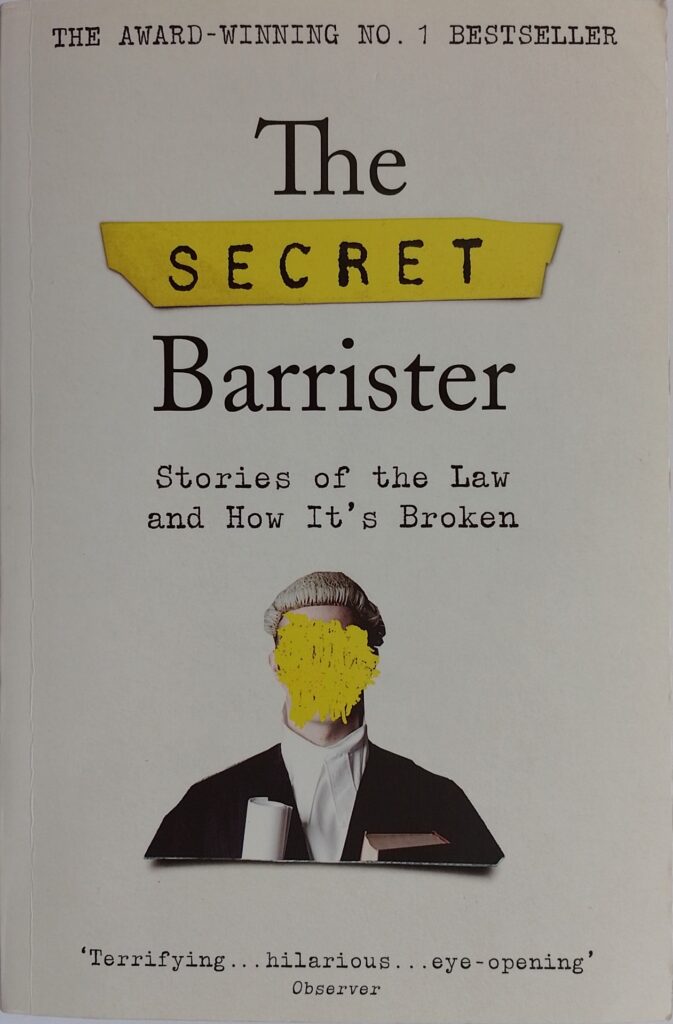First published 2018. Picador paperback, 2019, pp 374, c.110,000 words (main text).
If anyone knows how to argue their case it should be a barrister, and this book is certainly well argued. It is one of those books that makes me mad with every page (just like The Search for the Panchen Lama by Isobel Hilton): how can this have been let happen? What were we thinking of when we elected the people who made these decisions?
The book takes us step-by-step through the criminal-justice system as it operated in England and Wales [E&W] at the time of writing. Some very brief history is given of how the system we have today came about, just sufficient to provide a little context, but this is by no means a history book. There are also some equally brief international comparisons, but again these are more about context, and to demonstrate that other systems are possible. On the whole Barrister considers the current E&W legal system to be as good as any other; preferring the adversarial approach with its equal right to representation to that of inquisitorial systems which may be more vulnerable to state capture.
Barrister’s main complaint is the way state funding has been steadily withdrawn from the system since the financial crisis of 2009 and the subsequent election of the Cameron-Osborne government which embarked on a programme of austerity budgeting. They found the criminal-justice system an easy (if small) target to slash. Every element is now creaking with shortages of staff and loss of expertise: the police, the crown prosecution service, legal aid (and consequently criminal law solicitors and barristers,) the courts, prisons and probation service, and even compensation for those wrongfully prosecuted and imprisoned. The system relies on a raft of volunteers from magistrates to jurors and councillors. The private sector has been enlisted to help out, and to achieve profitability it has cut service quality.
Politicians have justified these cuts by comparing legal aid budgets between E&W and other countries to show how over-generous our system is. A fine case of comparing apples and oranges. They have crowed about sentence review reforms that have resulted in much tougher penalties, while not mentioning that ten times as many reviews have resulted in cuts to sentences.
Being tough on crime has always been popular, as has ‘victim’s rights’. ‘Prison works’, only it doesn’t – reoffending rates are shockingly high.
Barrister persuasively argues that the reason recent Governments have got away with this is that most of us don’t encounter the criminal justice system (thank goodness), and don’t expect to, which is statistically correct. However, those unfortunates who do are shocked and horrified by what they find: endless delays and postponements, shockingly over stretched staff. Amateur magistrates that are far from representative of the people they judge. If you ever get sucked into the system, then God help you. If you are entitled to legal aid then you will be provided with a solicitor and a barrister, both juggling many cases each day. If you are sufficiently well-off not to qualify then you will be reliant on your own resources and prey for sharks offering ‘pile them high, sell them cheap’ services, and even these legal costs pile up frighteningly fast until you may be ruined. And if you are found innocent, the system is likely to weasel out from paying your costs, let alone provide compensation for time lost and relationships destroyed.
A recent BBC news item reported that the number of criminal solicitors who are provided to those entitled to legal aid has declined steadily from 5,500 twenty years ago to less than 3,500 today, and there are no indications of a reverse in that trend as the average age of those practicing continues to rise and few young solicitors are attracted to below minimum-wage legal-aid criminal work.
The writing here is straightforward and persuasive. There is almost no inaccessible legal jargon used. Phrasing is easily digestible. Myths are debunked. It is not a bundle of amusing anecdotes or case histories strung together. There is a little humour, mostly of the gallows variety.
Barrister is aware that their case may be seen as special pleading, but even if one leaves their part of the system out, there are so many short-falls in the rest of the system that the case is compelling. Many official reports have come to the same conclusion: ‘But to bang again on this rusty, perforated drum, the primary cause that is identified by every person in the system, every parliamentary report and every purse-lipped auditor remains lack of proper funding.’ [p144] The Ministry of Justice’s budget was £9.1Bn in 2009/10 and had been cut to £7.4Bn by 2015/16. It has since crept back to £9.4Bn by 2021/22, and further increases are promised. ( https://www.statista.com/statistics/1098367/justice-spending-in-the-uk/ ) However of that £2Bn increase, £1.4Bn was spent on prisons which accounted for over half the department’s budget. ( https://www.statista.com/statistics/298654/united-kingdom-uk-public-sector-expenditure-prisons/ )
‘The bottom line is… it’s getting numbers through the door as inexpensively and swiftly as possible. It’s roulette framed as justice’ [p80].
We don’t look at Romania and say because their government spends half the amount per head on health care than ours does, we should too. Isn’t it reasonable that we have a criminal justice system that is able to deliver a high standard of justice? Read this book and get mad too.
The Secret Barrister’s blog: https://thesecretbarrister.com/
Wikipedia summary of the book: https://en.wikipedia.org/wiki/The_Secret_Barrister
Others’ reviews of the book: https://www.goodreads.com/book/show/36620738-the-secret-barrister?from_search=true&from_srp=true&qid=7pTcARM4ZL&rank=1
© William John Graham, June 2023

